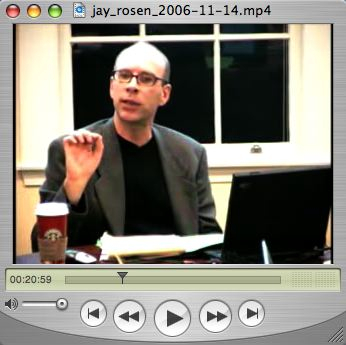Open Source Journalism
 NYU Journalism Department Professor Jay Rosen (pictured) has started a new project where he's tapping the energy of hundreds of amateur journalists to do what he calls open-source investigative reporting.
NYU Journalism Department Professor Jay Rosen (pictured) has started a new project where he's tapping the energy of hundreds of amateur journalists to do what he calls open-source investigative reporting.Sound cool or what?
His project -- NewAssignment.net -- is still in beta, but Rosen's started a blog where you can watch the project blossom (or wilt).
He's published a lengthy post about open-source journalism in his blog, PressThink. It's a two-part Q & A with former Times-Picayune reporter John McQuaid, which drills down some of the key issues traditional reporting currently faces; McQuaid identifies 2 in particular:
- more people have more access to information. According to McQuaid:
"When I started out, we got “the wires” on our office computers, and I thought that was pretty amazing back then — AP dispatches and updates in real time! [...] But of course, a great tool for us was equally great for everybody else. Readers now have access to almost all the information that journalists do, and they began sharing it, commenting on it and picking apart the stories. Hence many problems bloomed for the mainstream press, which declined in relevance and lost some credibility."
- news consumers are choosing alternatives to 'top-down' traditional reporting. McQuaid again:
"I never much liked the “Voice of God” emanating from the NYT and other influential institutions. It was entertaining — and often useful — to see platoons of bloggers pick it apart and puree the pronouncements (sometimes fairly, sometimes not). Reading some of those critiques made me increasingly dissatisfied with newspaper conventions. In a highly partisan landscape, straight newspaper accounts of political fights that dutifully parroted “both sides” or interviewed a bunch of talking heads offering differing perspectives often did a bad job of capturing what was really happening. But a single blogger could often get to the nub of an issue in a single paragraph (usually, of course, by analyzing the journalism)."McQuaid also discusses some the ways that journalists can tap into new online tools and communities to help them write their stories:
"communities of experts are especially valuable. The world is complex, and increasingly run by subcultures of people with very specialized knowledge. In most cases, they’re already wired together – fisheries specialists, scientists and engineers, federal regulators, political operatives. If you make an entree into these groups via listserv, blogging, website, and they’ll work with you in either an organized or ad hoc way, you’re halfway there."Milo Sybrant

0 Comments:
Post a Comment
<< Home